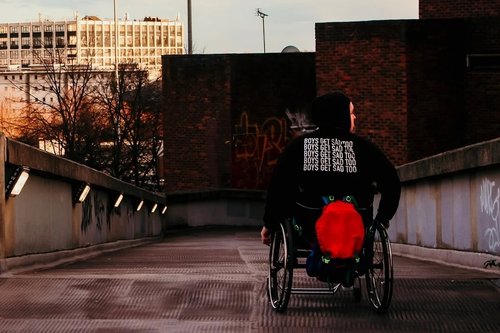Radio silence from your recruiter? Not necessarily a bad thing…
Jan 18, 2022
5 mins


Journaliste - Welcome to the Jungle
Along with a nagging sense of uncertainty and the constant desire to hassle your recruiter for updates, it’s pretty normal to have a knot in your stomach post-interview. So how do you stay zen, especially when your phone hasn’t rung? What if the time spent waiting—although it might feel as long as an endless winter—wasn’t necessarily such a bad thing? Mila Elhamdi, a coach and career-management consultant, shares her advice for dealing with those moments, which can feel fraught with anxiety.
Now, after all that preparation, and actually getting through the interview in one piece, the ball is no longer in your court. But the wait can seem endless. Your stress levels have increased—intensifying all your doubts—and you’re about ready to throw in the towel rather than continue to wait. If they haven’t called you yet, it probably doesn’t bode well for you, right? It feels even worse when recruiters give no sign of life. But silence doesn’t mean failure—there are plenty of reasonable explanations for it. So, how do you manage those moments when it feels like time has stopped?
They’ve gone silent: what does it mean?
The difficulty of waiting
A few months ago, Audrey had an interview for her dream job. She liked everything about the company—the projects, the responsibilities, the sector—and she prepared for the interview as though it were a marathon. But on the day, the questions were complicated, which ended up unsettling her, and, despite all her skills, Audrey’s self-confidence took a hit. She left feeling defeated, stressed and disappointed in herself, convinced she was going to have to get back on the job hunt—before finding out not long after that she had got the job.
Alexandre, on the other hand, applied to a brand he was particularly keen on after graduating. He was already friendly with the boss so he got in touch with him, then kept his fingers crossed. The first interview confirmed his feeling that he was in with a chance; then there were follow-ups; and the final interview. That was the beginning of a long wait. Alexandre didn’t lose hope, but he got tired of waiting and not hearing anything. He had to wait a whole two months to get an answer—they had gone with another candidate, leaving him disappointed and frustrated. All that time spent waiting, when he could have been looking elsewhere. It doesn’t matter what the outcome is: waiting always makes the situation feel that much more unpleasant.
Mila Elhamdi agrees: “There’s nothing more human than the dread of waiting for something. Self-evaluation is an almost constant reflex, and coming out of an interview where you have been evaluated by someone else only makes you judge yourself that much harder.” This reaction causes candidates not just to second-guess their performance, but also to imagine a thousand different scenarios based on the possible outcomes. “And the fact that you’re dependent on other people to be able to curb these thoughts doesn’t really help at all,” Elhamdi says. So how do you regain control of a situation over which you have no control?
The different scenarios that might explain it
While some recruiters will give their final response just a few days after your interview, others might give the impression that they’ve completely forgotten about it. “But while not getting a response is something to be wary of, it’s not necessarily a bad sign. There are lots of possible explanations,” says Elhamdi. Here are four common scenarios:
Their silence might just mean the recruitment process is still going on. “If the deadline has come and gone, there are probably candidates who applied late, pushing the timeframe back,” Elhamdi says. Perhaps they’re waiting for another candidate’s response before coming back to you?
It could be down to organizational issues within the company. “It might be because there’s an employee who’s ill or out for one reason or another, or maybe it’s a lack of communication between the recruiting firm and the department heads,” says Elhamdi. It’s important to be wary if it’s the latter: poor communication could also be a sign of lack of internal organization.
The recruiter may be paying extra attention to your application. “If you mentioned any references during the interview, they may want to check on those, or verify your qualifications and their relevance to the job.” It’s not uncommon for a company to do their research after an interview, especially if they’re going to go to a second round.
The recruitment phase might also be put on hold in order for them to re-evaluate what the job entails. “If they’ve met several candidates, some might have claimed they could bring even more to the position with their skills and experience,” says Elhamdi. HR might even rethink the job description then look at your application again to make certain you’re still in the running.
Whatever happens, there’s no reason to panic—the game isn’t over yet, particularly as you’ve got a role to play.
Six tips for managing the wait
All you can do is wait the silence out. But it’s still possible for you to find strategies to help overcome the more unpleasant aspects of waiting while calmly anticipating a response.
1. Put things in perspective
While you’re waiting, take a step back. “There’s an uncertainty that’s open to interpretation, so it’s better not to replay the interview over and over again in your head ,” Elhamdi says. Try the opposite instead: remind yourself that this is all part of the interview game. “It’s even more important to keep it in perspective if the job description itself is being re-evaluated.”
2. Find out about the company’s practices
While most companies let candidates know what’s going on as the process unfolds, there are others that don’t take deadlines into account, and don’t let candidates know when decisions have been made or the position has been filled. A good way to know about this beforehand is to ask during the interview. “If a recruiter’s answer is ambiguous, there are sites like Glassdoor that let candidates look at how a company functions,” says Elhamdi. Are these their normal working practices? That should give you a firm idea of what they’ll be like as employers.
3. Respect their deadlines
Recruiters will often tell you ahead of time when they’ll be able to get back to you. And whether that’s a specific date or a vague time frame, it’s important to respect the deadlines the company gives you. “There’s no point wanting to know before the recruiter has even made up their mind,” says Elhamdi. “*You also don’t want to come off as insistent or look like you’re desperate.”* So while it’s totally normal to want to know, you need to wait until the deadline has passed.
4. Call them
As the callback date approaches, get into the habit of giving the recruiter a quick call. “Because if they don’t get back to you immediately, my first piece of advice is to call them,” says Elhamdi. “That’s much better than writing to them. You avoid the risk of your email getting lost and it keeps communication simple.”
5. Don’t just sit and wait
Contrary to what you might think, even though you’re in the middle of the interview process for a particular job, don’t just sit back and wait. “It’s actually quite important to stay reactive in your job search, especially if you get any other offers,” says Elhamdi. “And if you do get other offers, let them know—it will make you look even more attractive to the recruiters.” Not only does this give you the upper hand, but in some cases it can even speed the process. You’re showing them that you’re sought after and recruiters will take notice of this.
6. Think about what might come next
Up until the very last minute, “keep thinking about different possibilities and opportunities,” says Elhamdi. “If you’ve been in contact with the recruiter a couple of times and it’s still unclear, move on. You need to keep looking.” If you didn’t get the job, go back over the interview, replay the moments that didn’t go well, ask for feedback and keep practising. If you were able to get this interview, you’ll get others. You should feel confident about that.
In short, it’s important to remain active in this period of uncertainty, both in your attitude and your search for new opportunities. It’s up to you to turn the situation to your advantage.
Photo: Welcome to the Jungle
Translated by Kalin Linsberg
Follow Welcome to the Jungle on Facebook on LinkedIn and on Instagram and subscribe to our newsletter to get our latest articles every day!

More inspiration: Job interview follow-up

Young parents: How to negotiate benefits with a potential employer
While ‘more sleep’ may not be on the table, there are plenty of parental benefits you can ask for from a new employer.
Dec 20, 2023

Accepting a job offer below your salary expectations: Is it a smart move?
After a grueling hiring process, you receive a sub-par offer. How do you handle it?
Nov 07, 2023

How to ask about disability accommodations in an interview
Here's to knowing what you're entitled to, and then getting it.
Oct 24, 2023

Exiting gracefully: Navigating a withdrawal from the hiring process
Not a good fit? Salary below expectations? Got a better offer? There are plenty of reasons to pull out of the hiring process. Here’s how to do it.
Oct 18, 2023

Job hunt: Here's what you can negotiate beyond salary
PTO, equity, health insurance, student loan repayment ... yes, please!
Sep 21, 2023
The newsletter that does the job
Want to keep up with the latest articles? Twice a week you can receive stories, jobs, and tips in your inbox.

Looking for your next job?
Over 200,000 people have found a job with Welcome to the Jungle.
Explore jobs